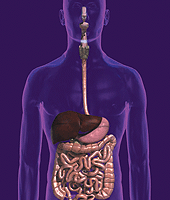A Symbiotic Relationship
The body's gastrointestinal tract or gut is central to maintaining health as it is this set of organs that digests food to properly nourish the body. Good digestion requires normal flora (good bacteria) and a healthy pH balance in the gut.

The body's gastrointestinal tract or gut is central to maintaining health as it is this set of organs that digests food to properly nourish the body. Good digestion requires normal flora (good bacteria) and a healthy pH balance in the gut. A healthy balance of normal gut flora is called symbiosis.
Dysbiosis Defined
When there is an imbalance of normal flora, dysbiosis results, leading to uncomfortable and unhealthy intestinal symptoms. Intestinal dysbiosis can cause or participate in many chronic, debilitating diseases, including Crohn's disease, irritable bowel syndrome (IBS), candidiasis (an overgrowth of Candida albicans has been linked to gastrointestinal disorders), ulcerative colitis, and food allergies.
Dysbiosis stems from overuse of antacids, histamine type 2 receptor antagonists (H2 blockers), antibiotic abuse, use of non-steroidal anti-inflammatory drugs (NSAIDs), food allergy or sensitivity, and contaminated foods. Additionally, emotional stress, poor dietary choices, and impaired digestion can play significant roles in dysbiosis.
Finding Balance
Whole, unprocessed foods in their natural, balanced state offer complete nutrition and plenty of good micro-organisms for normal gut flora. However, a whole foods diet is difficult to come by. Soil organisms have been depleted through modern farming techniques that use pesticides, herbicides, fungicides, and mechanization to keep up with the cost of inflation and field production. Add to that the standard North American diet and our modern lifestyle and you have three factors that can inhibit good micro-organisms and foster unhealthy acidity in the gut. When good micro-organisms are low in number, then bad micro-organisms can take over, causing a vast array of health maladies that include dysbiosis, excess acid, and digestive disorders.
Consuming whole, unprocessed foods and whole food digestive health supplements can foster balanced gut flora and offer a way to get good micro-organisms and alkalinizing factors into the gut, thereby supporting digestive health.
Did You Know?
- According to the International Foundation for Functional Gastrointestinal Disorders (iffgd.org), about 21 percent of Canadians may suffer from GERD (gastroesophageal reflux disease).
- More than 20 percent of Canadians experience heartburn at least once a month and about 40 percent are daily sufferers of heartburn that can lead to GERD.
- Digestive disorders drive one out of every three Canadians into doctors' offices each year.
- After prescription drugs for heart disease and blood pressure, stomach remedies or laxatives are the next most commonly prescribed drugs, used by 14 percent of women and 9 percent of men, says Statistics Canada.
- Next to the common cold, gastrointestinal motility disorders cause the highest percentage of absenteeism from the workplace.
- Irritable bowel syndrome (IBS) alone affects between 15 and 20 percent of people in the Western countries, the journal Digestion reported in 2003.




